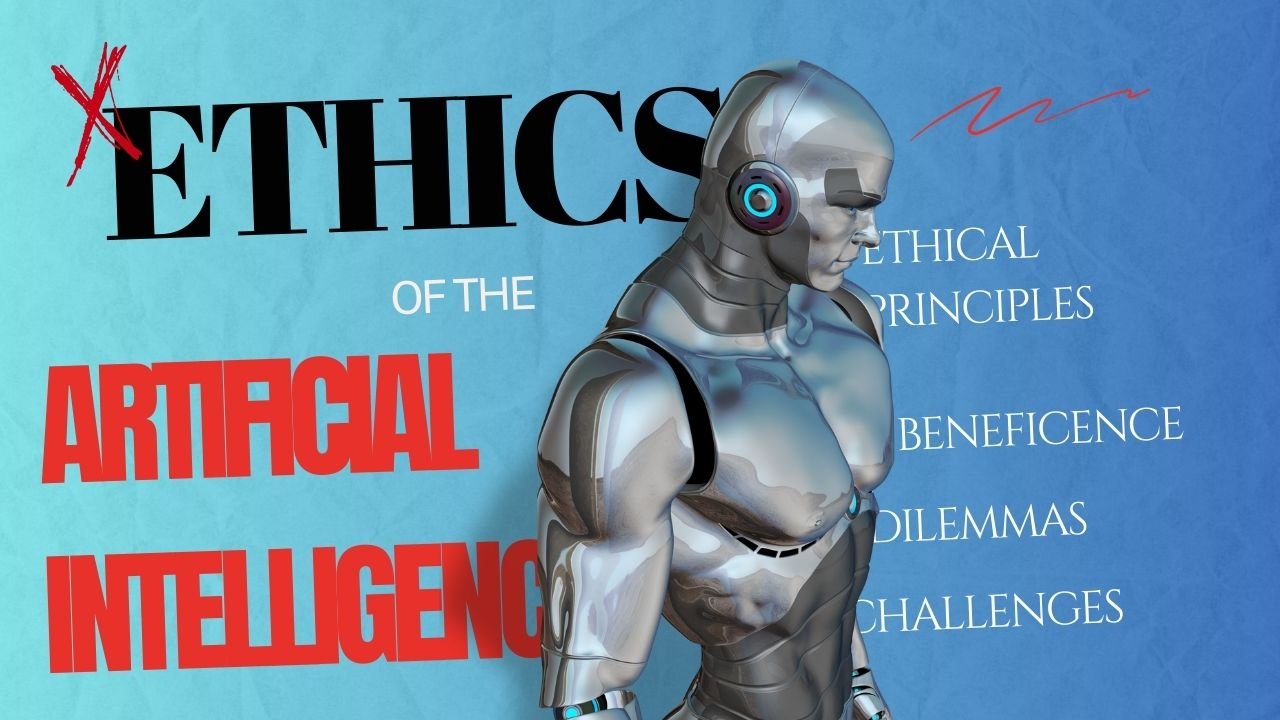Let's Read About Ethics of Ai
An Introduction to Artificial Intelligence
The development of artificial intelligence (AI) Ethics of AI is changing how we communicate, work, and live. AI is becoming more and more capable, with applications ranging from clever personal assistants to driverless cars. However, there are important ethical issues that go along with these breakthroughs. This essay explores the moral implications of artificial intelligence, looking at its advantages, drawbacks, and ethical conundrums. The term artificial intelligence describes the process of creating computer systems that are capable of carrying out activities that normally require human intellect. These tasks involve language translation, speech recognition, visual perception, and decision-making. AI technologies come in two varieties: narrow AI, which is made for specialized activities, and broad AI, which can carry out any intellectual work that a person can. AI’s rapid development is changing economies and businesses. Without explicit programming, computers may learn from data and gradually improve their performance because of AI techniques like machine learning and deep learning. Significant progress has resulted in domains including healthcare, banking, and transportation.
Benefits of AI
Productivity and Efficiency: Artificial intelligence (AI) can analyze enormous volumes of data quickly and accurately, boosting productivity and efficiency in a variety of industries.
Healthcare Advancements: AI-driven systems can help with illness diagnosis, therapy personalization, and outcome prediction.
Enhanced Client Service: AI chatbots and virtual assistants improve client experiences by offering prompt assistance and replies.
Innovation and Creativity: AI may provide novel concepts, items, and fixes, which encourages innovation and creativity.
Challenges of AI
Job Displacement: AI-driven automation has the potential to displace workers in several areas, which raises issues
with unemployment and economic inequality.
Privacy Issues: AI systems frequently need vast volumes of data, which, if improperly managed, may endanger personal privacy.
Discrimination and Bias: AI systems have the potential to reinforce or even magnify biases found in training data,
producing unjust results.
Security Risks: AI technology has the potential to be used maliciously in campaigns of disinformation and cyberattacks.
Ethical Principles in AI
1. Making AI systems’ decision-making processes visible and intelligible to people is a key component of transparency in the field. This promotes responsibility and fosters trust. Developers ought to make public the data they utilize, how AI algorithms operate, and the standards by which they make choices.
2. AI programs need to take responsibility for their deeds and results. This entails defining distinct roles and responsibilities for the implementation and management of AI systems. Any harm brought about by an AI system should be the responsibility of the companies and engineers.
3. In order to ensure justice in AI, biases in algorithms must be removed, and everyone must be treated equally. To stop biased behaviors, this calls for a variety of representative training data sets in addition to constant monitoring and system adjustments.
4. In the era of artificial intelligence, privacy needs to be protected as a basic right. AI systems must be created with the protection of private information and individual control over it in mind. This entails getting users’ informed permission and putting strong data protection procedures in place.
5. When creating and using AI technology, safety must come first. Thorough testing is necessary to make sure AI systems are dependable and don’t endanger people or society. Addressing any weaknesses that malevolent actors can exploit is part of this.
Beneficence
AI should be designed and used for the benefit of humanity. This means prioritizing applications that enhance human well-being and contribute positively to society. Developers should consider the long-term impacts of AI technologies and strive to maximize their benefits while minimizing potential harm.
Ethical Dilemmas in AI
Autonomous Weapons: There are a lot of ethical questions raised by the development of autonomous weapons, which can choose and attack targets without the need for human assistance. The necessity for stringent laws and moral standards in military AI applications is highlighted by the possibility of abuse, unintentional interactions, and conflict escalation.
Surveillance and Privacy: Surveillance systems with AI capabilities can improve security, but they also put human liberties and privacy at risk. Widespread discrimination, intrusive surveillance, and the loss of individual liberties are possible outcomes of the application of face recognition and other monitoring technologies.
Decision-Making and Bias: When AI systems are utilized in crucial decision-making domains like lending, recruiting, and law enforcement, biases in their training data may be reinforced. People may be treated unfairly as a result of this based on their gender, color, or other protected traits. To stop discrimination, these processes must be made fair and transparent.
AI in Healthcare: Healthcare might be revolutionized by AI; however, there are ethical questions around data privacy, permission, and the precision of diagnoses made by AI. Trust and safety in healthcare depend on AI systems functioning as a supplement to human judgment, not as a replacement for it.
Economic Inequality: Because AI technologies concentrate money and power in the hands of those who control them, they have the potential to worsen economic inequality. Policies that support fair access to AI benefits and reduce the likelihood of job displacement are necessary to address these inequities.
Regulatory and Policy Frameworks: Strong legislative and policy frameworks are required to traverse the ethical terrain of artificial intelligence. The research and use of ethical AI are governed by rules and standards that are being worked out by governments, international organizations, and industry entities.
International Initiatives: International norms for AI ethics are being developed by key organizations, including the OECD, the UN, and the European Union. The aforementioned efforts seek to foster cooperation and guarantee the responsible development and application of AI technology.
National Policies: Numerous nations are developing national AI programs that incorporate moral principles. The European Union has its Ethics Guidelines for Trustworthy AI, but the United States has its AI Bill of Rights. These laws offer a foundation for moral AI research at the federal level.
Role of AI developers
The ethical environment around artificial intelligence is greatly influenced by AI developers. Beyond technical competence, they have ethical obligations that guarantee AI technologies are created and applied in a way that is advantageous to society. In this perspective, the principal functions and duties of AI developers are as follows:
Data Collection and Preprocessing: To train models, AI engineers need to employ a variety of representative datasets while actively looking for and reducing any biases in the data.
Algorithmic Fairness: To make sure AI systems serve all users equally, they should have procedures in place to identify and fix biased results.
Data protection: To prevent breaches and misuse of user data, developers should put strong security measures in place.
Anonymization: Ensuring that personal information is protected by anonymizing data utilized in AI systems.
Consent Management: When using data, developers need to include procedures for getting and keeping user consent.
Explainable AI: The goal of explainable AI is to develop models that make it simpler for users to accept and validate the results by offering concise, intelligible justifications for their choices.
Open Communication: When explaining AI systems to consumers and stakeholders, developers should be very explicit about their capabilities, limits, and potential biases.
Documentation: Keeping accurate records of the development procedure, selection standards, and justifications for design decisions.
Ethical Standards: Following accepted moral principles and industry norms while encouraging the creation of new ones as the area develops.
Human-Centric Design: Rather than just replacing human work, this approach focuses on creating AI systems that augment human skills and increase quality of life.
Impact assessments: Regularly evaluating the social ramifications of AI applications and implementing corrective measures for any unfavorable consequences.
Interdisciplinary Collaboration: Including a variety of viewpoints in AI research by collaborating with ethicists, sociologists, and other specialists.
Continuous Learning: Keeping up with the most recent developments in AI ethics and applying best practices to their work.
Advocacy: Promoting moral values in their companies and the larger technology community.
Ethical AI Leadership: Setting an ethical example and encouraging a culture of accountability among colleagues and upcoming developers are two aspects of ethical AI leadership.
Long-term Implications
Superintelligence: Handling the dangers of artificial intelligence (AI) systems that are more intelligent than humans.
Global Cooperation: International cooperation is encouraged in order to create standards and laws that guarantee the moral and secure advancement of artificial intelligence.
Regulatory and Ethical Frameworks
To direct the moral development and use of AI, a number of frameworks and principles have been put forth, including:
The Asilomar AI Principles: Guidelines created by AI researchers to guarantee the advantageous use of AI are known as the Asilomar AI Principles.
The EU AI Act: The European Union’s planned legal framework to regulate the use of AI is known as the EU AI Act.
Conclusively, for ethical AI development to successfully negotiate these intricate difficulties and guarantee that AI technologies benefit society as a whole, technologists, ethicists, legislators, and the general public must work together. The domain of artificial intelligence ethics is intricate and crucial, encompassing a range of issues like impartiality, equity, confidentiality, openness, responsibility, and the influence on society. A comprehensive strategy involving varied datasets, thorough audits, open communication, unambiguous responsibility, and proactive social actions like reskilling and strong safety nets is needed to address these ethical concerns. Furthermore, in order to guarantee that AI technologies improve human capacities and social well-being without harming people or escalating already-existing inequities, the development of ethical AI must be directed by extensive legal frameworks and international collaboration. We can encourage the appropriate and advantageous use of AI and make sure technology is a vehicle for constructive social development by giving ethical issues top priority.
In Conclusion



